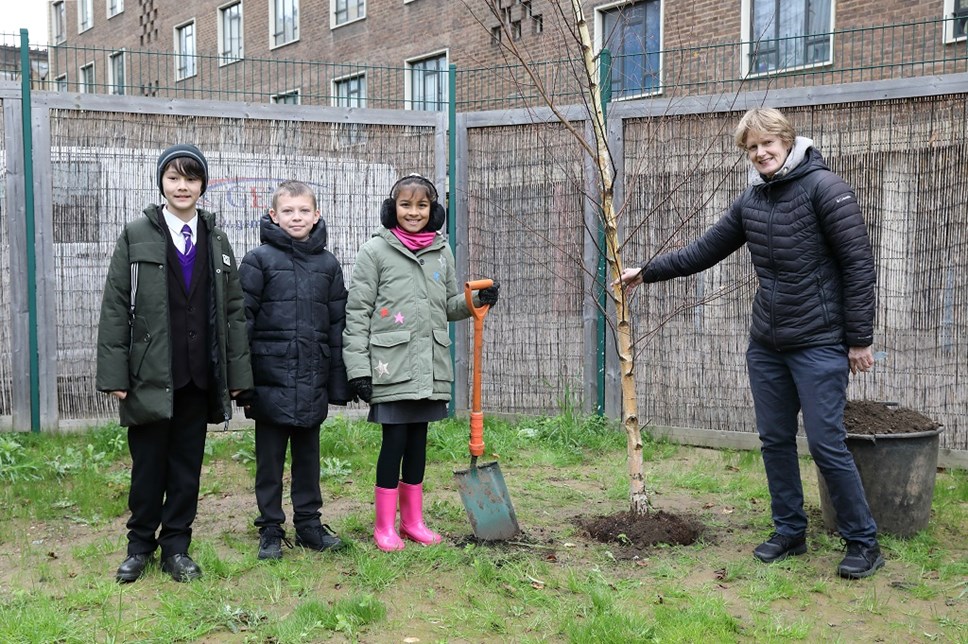
Council plants ‘Forest for Change’ trees at Hugh Myddelton Primary School
Islington Council has planted some of the borough’s first trees from the ‘Forest for Change’ exhibition at Hugh Myddelton Primary School, as a symbol of its ongoing commitment to creating a cleaner, greener, healthier borough for all.
Around 200 trees have been donated to the borough by Forest for Change, an interactive art installation that was on display at Somerset House in June 2021 as part of the London Design Biennale.
The arrival of the trees is a joint project between the council and local group Islington Clean Air Parents, who have crowdfunded £15,000 to cover the cost of transportation and after-care of the trees. Islington Council has provided support with logistic arrangements, providing expertise and taking on the long-term maintenance of the trees.
On Tuesday, 30 November, the council planted some of the borough’s first Forest for Change trees at the Hugh Myddelton Primary School.
A total of six trees – including three Alders, two Silver Birches and a Silver Maple - were planted to help create a greener atmosphere outside the school gate, while contributing to an improvement in air quality.
Cllr Rowena Champion, Islington Council’s Executive Member for Environment and Transport, said: “It’s clear that urgent action is needed to tackle the climate emergency, and we’re working hard to create a cleaner, greener, healthier Islington.
“We are extremely grateful to Islington Clean Air Parents for working with us to bring around 200 Forest for Change trees to the borough, and for supporting us in planting some of the first trees at Hugh Myddelton Primary School.
“Islington already boasts an above average canopy cover, and we’re working hard to bring more trees to the borough to help tackle climate change. We’re looking forward to planting more Islington Forest for Change trees, and to seeing their benefits in bringing cleaner air to the borough.”
Trees are a vital part of the council’s ambition to create a cleaner, greener, healthier Islington. They remove pollutants from the air, provide vital cooling for people and plants, and support biodiversity.
Despite being one of the most densely populated local authority areas in England and Wales, Islington is an urban forest of around 40,000 trees. The borough enjoys 25% tree canopy cover, above the London average of 21% and significantly higher than the England average of 16%.
In addition, the council is also in the process of creating a tree warden programme, in which local people on housing estates will be invited to advocate for trees in their area.
Lucy Facer, from Islington Clean Air Parents, said: “Planting trees in and around schools is one of Islington Clean Air Parents' top priorities for this campaign. Children are at the heart of our motivation to make our communities better places to live, connect and thrive.
“The 200 trees we have brought to the borough through Islington Forest for Change will benefit children across the borough for generations to come, bringing clean air, addressing climate change, providing shade.
“Right here in the playground of High Myddelton School, children's health, wellbeing and learning will be boosted by the many benefits of playing in and amongst these trees."
Tim Barber, Associate Headteacher at Hugh Myddelton Primary School, said: “We're living in a time when artificial turf, rubber crumb and tarmac are the surfaces of choice for school play areas. Whilst these are practical solutions, the environmental impact is - in the long term - indefensible.
“We're delighted that Hugh Myddelton, Islington Council and Islington Clean Air Parents are able to buck the trend by planting these trees, which will soon by joined by a diverse range of native hedgerow plants and a 'real' lawn around the Spa Green Nursery, to provide year-round wildlife habitats, natural play opportunities for children and a dense air pollution barrier between the play areas and the local roads."
Contact information
If you are a member of the public with a general question about the council please view the contact information on our website or call 020 7527 2000.
